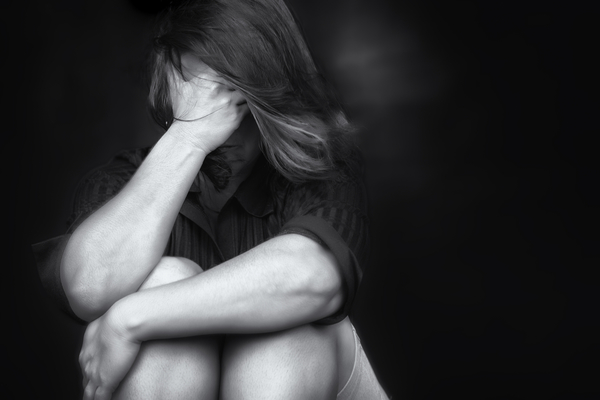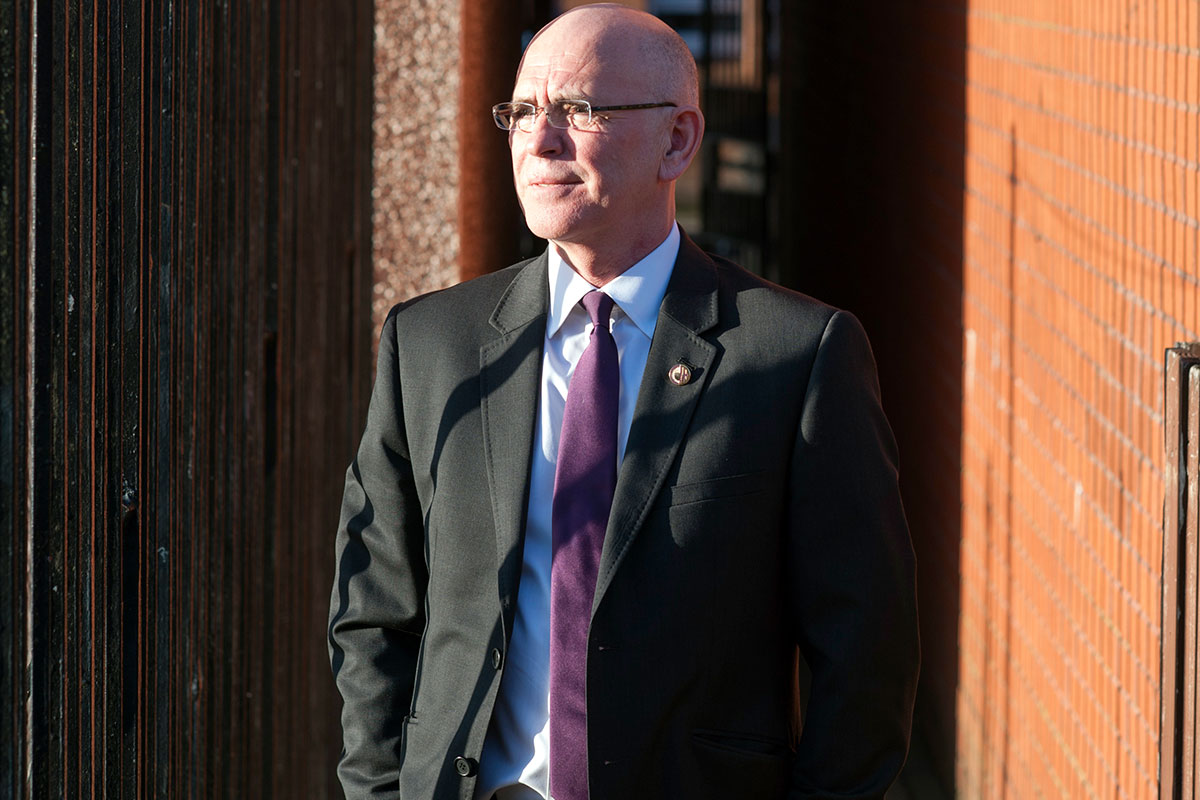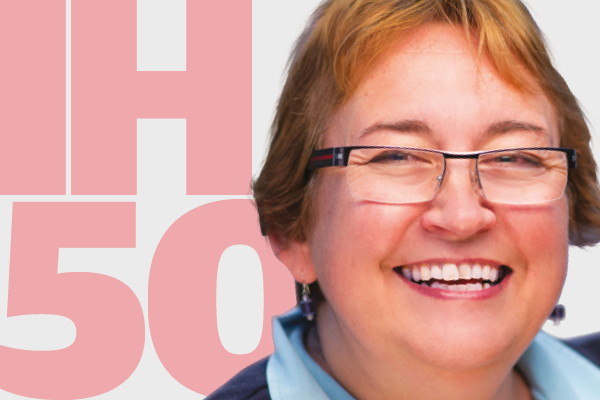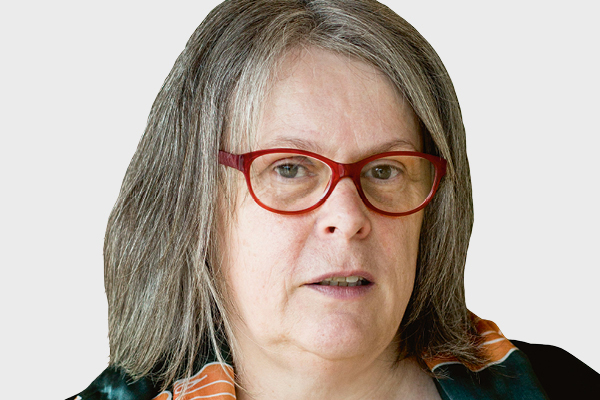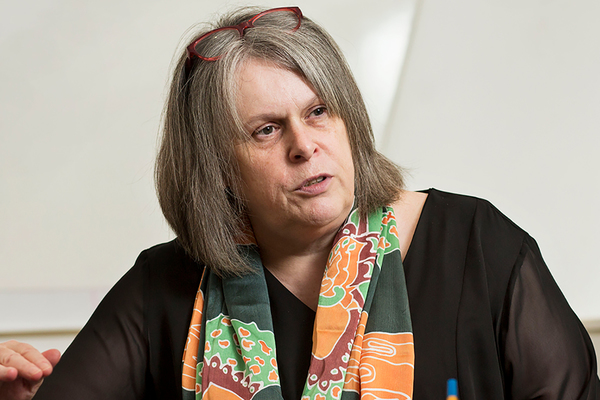You are viewing 1 of your 1 free articles

Sign up to Make a Stand against domestic abuse
Nearly 300 housing organisations have signed a pledge to tackle domestic abuse as part of the Chartered Institute of Housing’s Make a Stand campaign. If your organisation hasn’t signed up, what are you waiting for? asks Terrie Alafat
It’s estimated that 4.3 million women across England and Wales have experienced domestic abuse at some point since the age of 16, while on average two women are killed by their partner or ex-partner every week.
And police recorded 149,248 incidents of domestic abuse against male victims in 2017 – more than double the number reported in 2012.
On a purely financial level, the Home Office estimates that domestic abuse costs society £66bn a year.
“Housing is better placed than most to make a real difference”
Even a cursory glance at these eye-watering statistics will leave you in no doubt that we all have a responsibility to do more.
And we know that as a profession, housing is better placed than most to make a real difference.
That was the inspiration behind the Chartered Institute of Housing’s (CIH) Make a Stand campaign, in partnership with Women’s Aid and the Domestic Abuse Housing Alliance.
Launched in May 2018 by our former president Alison Inman, it asks housing organisations to make four commitments to support residents and staff experiencing domestic abuse. Alison really kick-started a debate about the role housing can play in tackling domestic abuse, and we are all so proud that almost 300 social landlords have signed up to Make a Stand so far.
Collectively they own and manage more than 2.6 million homes – that’s more than 50% of all social housing across the UK.
It goes without saying that we want to make that 100%.
Our current president Jim Strang is a passionate advocate for Make a Stand – partly because of his own horrific personal experiences as a child.
Jim was a regular witness to the violence his mother endured at the hands of his father, and was just nine years old when his father turned his fists on him for the first time.
If you haven’t read it yet, I urge you all to take a look at his extremely moving and inspiring interview with Inside Housing, published last month (January) – it will leave you in no doubt as to why your organisation should sign up to Make a Stand.
Last month also saw the publication of the draft Domestic Abuse Bill, which aims to address coercive control and economic abuse and to transform the response in the justice system.
In December I was very proud to be appointed chair of Hestia, which supports adults and children to recover from crisis.
“While there is a lot of important support for victims in the draft Domestic Abuse Bill, there are also key elements missing”
Hestia is one of the largest providers of domestic abuse refuges in London and last year supported 3,657 people to recover from the trauma of domestic abuse, including 668 children.
For me, a home provides more than shelter, it’s a place where families can grow – and that’s why it should be made a priority to support people who have experienced significant trauma.
My colleagues at Hestia point out that while there is a lot of important support for victims in the draft Domestic Abuse Bill, there are also key elements missing.
A lot of these things are recognised in the wider commitments that the Home Office is making alongside it, but these are obviously short term rather than being enshrined in law.
Through its UK Says No More campaign, Hestia is calling for children to be given protected status on waiting lists in the same way that looked-after children are to prevent them being disadvantaged on NHS and school waiting lists when they have to move accommodation to escape the abuse.
In addition, funding for refuge accommodation continues to focus on women and does not have provision for specialist children’s workers (almost all of Hestia’s children and family workers are funded through donations).
My colleagues are also calling for universal access to refuge accommodation at the point of need, as some women with no recourse to public funds are still turned away.
“We’ll be working with Women’s Aid and the Domestic Abuse Housing Alliance to provide more support to help landlords to tackle domestic abuse”
It seems that despite the significant steps forward in the government’s response to domestic abuse, local funding (which has already been stretched for a long time) continues to be further cut. That makes it harder for charities to deliver quality services that support recovery from trauma, not just provide a roof over someone’s head.
Similarly, Women’s Aid makes the point that sustainable funding must be at the centre of a more effective approach to tackling domestic abuse, adding: “The government must deliver the resources needed as well as legislation to make a real difference to survivors’ lives.”
At CIH, we will be doing everything we can to support our colleagues across the charity sector as the Domestic Abuse Bill makes its way through parliament.
We’ll be working with Women’s Aid and the Domestic Abuse Housing Alliance to provide more support to help landlords tackle domestic abuse, and we’re also working on a Make a Stand supporters’ pledge for organisations involved in the social housing sector that aren’t landlords – watch this space for the launch later this year.
In the meantime, if your employer hasn’t yet signed up to the Make a Stand commitments, please take a look and ask yourself: what are you waiting for?
Terrie Alafat, chief executive, Chartered Institute of Housing
Make a Stand
The ‘Make a Stand’ pledge has been developed by CIH in partnership with Women’s Aid and the Domestic Abuse Housing Alliance (DAHA) – made up of Standing Together Against Domestic Violence, Peabody and Gentoo. It was launched under the CIH presidency of Alison Inman in 2018, and then continued by her successor as president Jim Strang.
As of 6 February 2018, 300 organisations had signed up.
As part of the pledge, housing organisations can make four commitments to support people who live and work in housing who are experiencing domestic abuse.
These four commitments are:
* To put in place and embed a policy to support residents who are experiencing domestic abuse
* To make information about national and local domestic abuse support services available on your website and in other places which are easily accessible to residents and staff
* To put in place a HR policy and procedure on domestic abuse, or to incorporate this into an existing policy, to support members of staff who are experiencing domestic abuse
* Appoint a champion in your organisation to own the activity you are doing to support people experiencing domestic abuse
Click here to read a piece by former CIH president Alison Inman explaining more about the campaign

